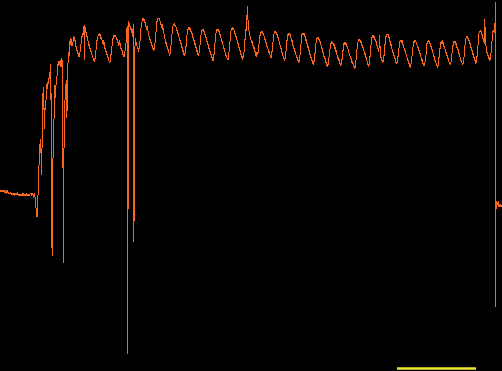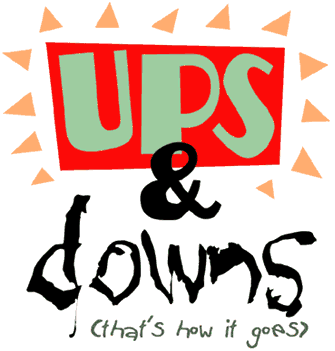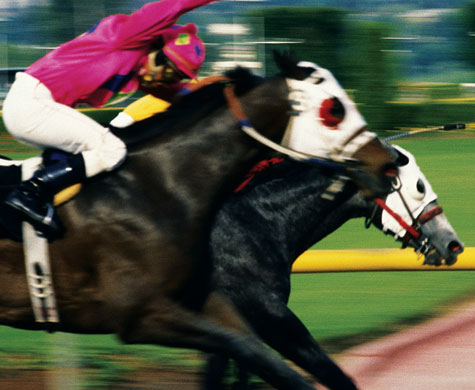Ocular Pulse Wave Example
This is what eye pressure (IOP) looks like in real time:

Please ask questions and I'll answer them.
Filed Under (tags):
- Read more about Ocular Pulse Wave Example
- dave's blog
- Log in or register to post comments
This is what eye pressure (IOP) looks like in real time:

Please ask questions and I'll answer them.
I have had my tonometer for almost 6 months. It has answered a multitude of questions about how my daily routine affects my health. I didn't know, for example, that just taking a walk outside for a half hour or so would reduce my eye pressure, sometimes by as much as 50%. I also didn't know that I wasn't one of the people whose pressures are higher at night--in fact my lowest pressures are at night. (That was good news. I was tired of sleeping with my head elevated).
I have found no supplements that had any effect on lowering my IOP, but I have found that some supplements will raise my IOP quite significantly. I know that out of control thoughts and periods of stress significantly raise my IOP in spite of the two drops I am using or any other healthy lifestyle choices I am making.
Read more...
Can eye pressure change daily? Does it change every day?
surely its perfectly normal for eye pressure to go up under certain circumstances. Just like our bp goes up and down. anne
 We now know that intraocular pressure does respond to events in our lives, to our state of mind and emotions and to stress. However, before FitEyes came along in 2006 (and for several years afterwards) these facts were not recognized.
We now know that intraocular pressure does respond to events in our lives, to our state of mind and emotions and to stress. However, before FitEyes came along in 2006 (and for several years afterwards) these facts were not recognized.
See this FitEyes article from Feb 2007:
http://fiteyes.com/Does-Stress-Increase-Eye-Pressure-For-Everyone
The standard medical opinion is that stress does not affect eye pressure (intraocular pressure). For example, see "Glaucoma - Frequently Asked Questions" at The Eye Institute states:
"As far as we know, stress does not affect eye pressure or the health of the optic nerve."
Another example of the prevailing medical opinion can be found in a Wills Glaucoma chat transcript on Stress and Glaucoma from July 20, 2005:
Patient: Does being nervous or stressed increase the IOP (intraocular pressure) as it does blood pressure?
Dr. Elliot Werner: Not as far as we know.
Even today many ophthalmologists will deny that stress affects intraocular pressure. They will further deny that non-stressful events such as Bailey described could affect eye pressure.
 I learned about emotions and eye pressure, in part, by watching my favorite sports and measuring my eye pressure over a period of years. See Watching Tour de France Raises IOP.
I learned about emotions and eye pressure, in part, by watching my favorite sports and measuring my eye pressure over a period of years. See Watching Tour de France Raises IOP.
Here is what I discovered after monitoring my eye pressure before, during and after watching sports over a period of several years.
 I need some way of measuring my nocturnal pressures. My daytime measurements are reasonably low most of the time, and relatively consistent. I want to start adjusting my medications (formulations, frequency, timing), but don't feel confident in doing this until I can take night time measurements.
I need some way of measuring my nocturnal pressures. My daytime measurements are reasonably low most of the time, and relatively consistent. I want to start adjusting my medications (formulations, frequency, timing), but don't feel confident in doing this until I can take night time measurements.
I know this is a concern for just about everyone who has glaucoma. I'm surprised there isn't more discussion on FitEyes about how to take night time measurements, and how to interpret the data (I'm pretty sure I've read all that's there).
hi my names robert, im from the uk, im 27 years old and have lived with ocd since i was about 14 years old. For some months i had been dealing with chronic hyperventilation which stressed me badly to the point where i felt that i could have had a break down due to the stress and took medication such as prozac, diazepam (only when i needed it) and went to a physiotherapist to help get my breathing back to normal.
I'd like to ask everyone with a tonometer and good eye pressure data to contribute comments to this post. What factors have we identified that affect eye pressure? I'm going to start the list informally with things that come off the top of my head. I'll revise and refine this list based on feedback from people with tonometers and good data. Thank you!
Reduces Eye Pressure
My original expectation was that elevated intraocular pressure would respond to herbs (and vitamins) in the same way every other physical complaint I had encountered in my life responded.
My initial strategy for managing my IOP was a strategy built on herbs and supplements. That strategy was a complete 100% total failure.
The entire following blog post was intially written as a private email to a friend of mine. I decided to share it here.
I grew up doing fast things in a fast way. I raced motorcycles -- and I have always loved anything fast. But I also tried to accomplish the maximum possible number of things each day and I always pushed myself to do things quicker or more efficiently. Then I developed glaucoma.
As I have gotten to know myself more intimately (thanks in part to self-tonometry) I have realized that I actually like to take my time. I enjoy doing things in a non-rushed manner. You could even say that I enjoy being slow! (Something I never would have admitted to myself in my days of racing, even in my most private thoughts.) Even today, I still have a great admiration for people who do things quickly, as if this is an inherently superior way of being.
But I now know that I like to take my time doi ng things. I still enjoy efficiency. But sometimes it is more efficient to delay the next project's start and finish what was started rather than have to terminate it due to an artificial deadline and then pick it up again at a later time. I like going deep into things (whether discussions, research or building software) and having the time to do it well. And I have found that sometimes I even enjoy doing something in a completely inefficient manner (saying that still sounds sacrilegious). Sometimes I enjoy just plain being slow! (What have I just said! My gosh!)
ng things. I still enjoy efficiency. But sometimes it is more efficient to delay the next project's start and finish what was started rather than have to terminate it due to an artificial deadline and then pick it up again at a later time. I like going deep into things (whether discussions, research or building software) and having the time to do it well. And I have found that sometimes I even enjoy doing something in a completely inefficient manner (saying that still sounds sacrilegious). Sometimes I enjoy just plain being slow! (What have I just said! My gosh!)